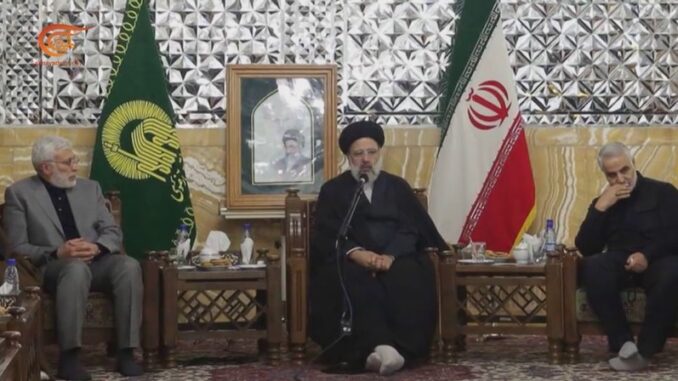
Description:
A short documentary by Al Mayadeen TV on the rise of President Ibrahim Raisi and whether his election will bring a major change to Iran’s strategy in the Middle East and the world.
We are translating and publishing this documentary as four parts. This is Part Three.
Watch Part One here
Watch Part Two here
Source: Al Mayadeen Documentaries (YouTube)
Date: August 7, 2021
( Please help us keep producing independent translations for you by contributing a small monthly amount here)
Transcript:
Narrator:
The reform of Iran’s old judicial system was one of the duties entrusted by the Leader of the Islamic Revolution to Raisi.
Citizen:
Two files were presented to the Imam regarding my 70% injuries (meaning the degree of his injury), which had gotten the proper authorisation. But they lost all the documents enclosed in my two dossiers.
Raisi:
This gentleman is a war veteran, and will come to the office. Please tell the gentlemen at the office to aid him. Today’s Thursday. Come to the provincial governor’s office on Saturday and someone will be assigned to follow up on your case.
Citizen (Lady):
I’ve been waiting here since 6 in the morning, shivering from the cold, to deliver this to you. I swear to you by Imam Husayn that you take it from me yourself by hand.
Narrator:
For the first time since the Islamic Revolution, he applied the jury system in courthouses in Iran. This was a step toward the recognition of the right to protest national policies. This (step) can be seen in the request he submitted to the Leader of the Islamic Revolution regarding the pardoning of a large number of people who took part in protests against the Rouhani administration; a request that was accepted by the Leader.
On the other hand, in a very rare step, 157,000 sentences were given without jail time during Raisi’s time as the country’s Chief Justice. This matter is, in and of itself, very interesting.
During his time as Head of Iran’s Judiciary, Raisi worked on fighting corruption in the country. One of the most important corruption cases involving executive officials in Iran was the arrest of Akbar Tabari, the executive deputy of Iran’s former Chief Justice, and his public trial. He headed a corruption and bribery group within the Judiciary.
As a result of this case, a number of judges and judiciary employees were arrested and jailed. A number of government administrators were pursued on account of their various crimes and infringements, and taken to court, starting with the brother of President Hasan Rouhani, as well as the Director of the Central Bank.
Raisi has had good relations with the regional resistance movement since the 1990s, and had an effective presence in conferences touching on the subject of resistance for many years.
Fatimiyoun Resistance fighter:
We were raised in the battlefield and (with the values of) martyrdom, and (we) performed our worship on carpets of blood. When the US and Israel witnessed our sacrifice, love, and (fighting in) war, they held back their anger. Such are the chants of the youth of Afghanistan. Let the world know that Sayyed Ali [Khamenei] is no different from [Imam] Khomeini.
Raisi:
Mashallah (how wonderful), I salute you. You (all) are the symbol of patience and steadfastness. By the will of God, you will make the believers happy and render the godless and arrogant hopeless. May God preserve and protect you.
Narrator:
(Raisi was also strongly present) in Syria aswell, while the flames of war were raging.
And in Iraq, he enjoys good relations with the leaders and officials and various resistance groups.
Raisi was the first senior official from Iran to travel to this neighboring country to pursue the case of the assassination of martyr Qassem Soleimani and his companions.
He stressed, during the meetings he held with the (Iraqi) President, Prime Minister, Chief Justice, and other Iraqi officials, on the importance of determining the fate of the judicial file pertaining to the case of the resistance leaders’ assassination. Thus, Raisi can be considered to be close to the resistance discourse in the Middle East. This became clear during the first press conference he held after winning the presidential elections.
Raisi:
The message of the people of Iran was that of their persistence on the values and principles of the glorious Islamic Revolution. The message of the people of Iran was that they will continue on the path of our great Imam and the great martyrs of the Islamic Revolution, especially our dear martyr and the prince of our hearts, Hajj Qassem Soleimani.
Narrator:
The new president faces a number of obstacles and opportunities in running the country. Domestically, he first needs to come up with a number of solutions for the many economic problems facing the people. This need is one shared by almost all the people.
Raisi:
We believe that improper relations, corruption and oppression, and (indeed) any oppressive and unjust relationship, are completely contrary to human dignity. If people knew the sweet taste of justice, they would not accept anything else.
Who is responsible for establishing justice? “that men may stand forth in justice” (a Quranic saying) It is the people that must do so. Today, I, as your servant and trustee, tell you that when you are present in the (various) fields, both men and women, and you dear youth must know, (both) men and women, that with God’s help, and your powerful hands, justice will be implemented in the country, God willing.
Subscribe to our mailing list!

Leave a Reply